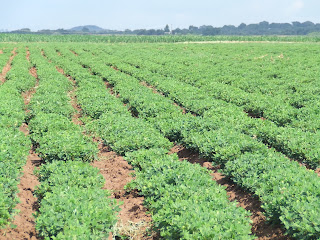 It is nearly one century and a half since man achieved
flight, and 60 years since he cracked space. Doctors are conducting
surgeries that made content for science fiction 40 years ago and humans,
in general, are advancing at dizzying speeds.
It is nearly one century and a half since man achieved
flight, and 60 years since he cracked space. Doctors are conducting
surgeries that made content for science fiction 40 years ago and humans,
in general, are advancing at dizzying speeds.Yet despite splitting the atom and converting the world into a global village, it is amazing that we have not found a solution for the plaguing food insecurity around the world.
It is estimated that one billion people globally are suffering from starvation
With these food-poverty levels characterising the continent, it becomes unflattering to realise that Africa boasts the world’s largest parcel of unused arable land — 202 million hectares, according to the World Bank. It is also mind-boggling to note that 61 percent of Africans work in agriculture, but the sector only accounts for 25 percent of gross domestic product (GDP), leaving 47,5 percent of the continent’s population living on less than US$1,25 a day. Curiously, a great majority of this starving population is made up of young individuals, who could be productively used for a radical shift in farm-based productivity.
So, with these resources being readily available, what is stopping Africa from becoming an agriculture-led economic powerhouse?
One of the biggest challenges for the farmers in the continent has been poor access to quality farm inputs. For example, just 20 percent of Africa’s farmers can access improved varieties of seeds. Other threats to Africa’s agricultural productivity include poor storage systems, lack of transportation services, inadequate processing tools and weak marketing structures, all of which lead to significant wastage.
In Nigeria for instance, the demand for tomatoes is put at 2,2 million tonnes while local supply is 800 000 tonnes. However, the actual production is 1,5 million tonnes of which nearly half, a mind-numbing 700 000 tonnes, is lost post-harvest, leaving the country to spend US$1 billion every year on tomato paste imports.
Similarly, in Kenya, a significant amount of maize went to waste in 2017 because of poor storage, leading to aflatoxin and pest attacks. And in 2015, the Kenyan government destroyed 754 015 bags of maize worth US$20 million after it was declared unfit for consumption following an extended storage period that saw it stay in stores for seven years.
The two cases present a picture that is replicated in several countries across Africa. Clear cases of hard work with aborted returns. Higher sector returns are further undermined by inadequate market infrastructure, weak institutions and support services, and poor policies.
Back to Kenya, potatoes are the second most important food and cash crop after maize, being grown by approximately 800 000 smallholder farmers. The crop employs 2,7 million players across the channels and contributes over US$500 million to the Kenyan economy.
But potato farmers are some of the most oppressed and poorly rewarded as far as input-output ratio is concerned. A major thorn in their side is the nature of packaging. Traders prey on the desperation, ignorance and disorganisation of the farmers to force through extended bags weighing between 110 and 280kg for the price of a 50kg sack. This is despite Section 42 of the Agriculture Act 2013, stating that the unit of measure of all agricultural produce is 50kg.
Thankfully, for potato farmers, there is hope of a better future, with several organisations advocating for favourable policies and structures. The Alliance for Green Revolution in Africa (AGRA), for instance, has collaborated with the Agriculture Council of Kenya (AGCK) to push for the enactment and implementation of the Irish Potato Act, 2018, which will guide the marketing of potatoes in the country.
The legislation will require potato farmers to be registered at the county level and collection centres established to open up the markets. The legislation also outlines the packaging and weighing standards of the produce.
Such policies will create order from the chaos in which middlemen thrive, as farmers who invest the most in the chain, wallow in poverty.
Similar efforts, if reproduced across the continent, will lead to the strengthening of agriculture as an economic resource that can pull Africa’s millions of poor out of poverty. But to achieve agricultural growth centred around the poor, governments across the continent are required to maintain a bold stance on policy reforms and formulation. Open dialogues between governments, farmers and traders must also take place with the conversations guiding design of public institutions, product grading and standards, plant protection regulations and market ethos.
It is only then that an agricultural transformation that will build social cohesion, drive beneficial continental trade, provide a platform for sustainable exports to the rest of the world, and, most importantly, help create millions of jobs while pulling subsistence farmers out of poverty, will happen.
Boaz Keizire is Head of Policy and Advocacy at Alliance for Green Revolution for Africa (AGRA) and 2017 Aspen New Voices Fellow.
No comments:
Post a Comment